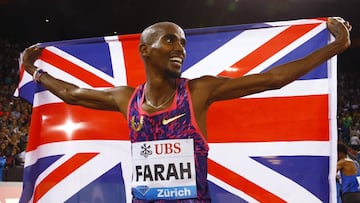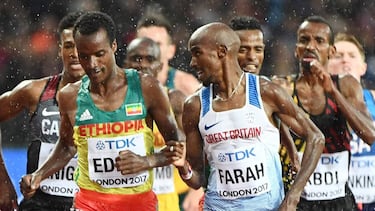Olympic distance runner Sir Mo Farah reveals he was trafficked as a child
Farah, the most successful British male track distance runner, has revealed that he was trafficked to the UK as a child and forced to work as a domestic servant.


Sir Mohamed Farah, ten-time world gold medalist and successful British distance runner, has just revealed that he was originally brought to the UK at nine years old by a woman who he did not know. He also said that his real name is Hussein Abdi Kahin. Farah told the story in a documentary by the BBC and Red Bull Studios called “The Real Mo Farah”, which will be released on Wednesday.
“It’s a secret I’ve been hiding since I was a child. And to be able to face it and talk about the facts, how it happened, why it happened, is tough,” said Farah, now 39 years old.
“The truth is I’m not who you think I am. And now, whatever the cost, I need to tell the real story.”
Olympic gold medalist Sir Mo Farah has revealed he was trafficked to the UK as a child, given a new name and forced to work a domestic servant
— philip lewis (@Phil_Lewis_) July 11, 2022
His real name is Hussein Abdi Kahinhttps://t.co/wN01Xd74nM pic.twitter.com/LEvN9pbcmW
It was previously believed that Farah came to the UK from Somalia as a refugee with his parents. Now, he says that his real family have actually never even been to the UK; his father was killed when Farah was just four years old, shot during the civil unrest in Somalia. His mother and two brothers currently live in Somaliland. The people who Farah actually lived with when he arrived in the UK were strangers to him.
The woman who took Farah told him that he would be going to live with some relatives in Europe and to tell people his name is Mohamed. Farah said he was excited because he’d never been abroad before. The excitement turned to dread when he realized he was not going to see his family again. He told the BBC that the woman ripped up a paper with his family’s contact details, right in front of him. “At that moment, I knew I was in trouble,” he said. Farah was forced to do housework and take care of other small children when he arrived in the UK. If he refused, he may have gone without food.
Running saved Farah
How did a nine year old boy ripped from his family and brought to a foreign country by strangers who neglected him become a successful and decorated world athlete?
The people who took Farah would not allow him to go to school for a few years. Thus, he knew very little English and was socially withdrawn. When he was 12, they allowed him to enroll at Feltham Community College. They told the staff, who recognized that he had been neglected, that he was a Somalian refugee.
At that school, he found running. It was a way for him to escape what was happening to him. His PE teacher, Alan Watkinson, said, “The only language he seemed to understand was the language of PE and sport.”
It was Watkinson in whom Farah eventually confided about what was really going on. And it was Watkinson who helped him through the gruelling process of applying for British citizenship. After contacting social services, Farah went to live with another family from Somalia.
“I felt like a lot of stuff was lifted off my shoulders, and I felt like me,” said Farah. That’s when Mo came out - the real Mo.”
Farah was already thriving as a recognized athlete by the age of 14. He was invited to compete in Latvia, and that’s when he began the visa process. It was all of this that allowed Farah to come out of his situation stronger and to make his way to a better life.
“I had no idea there was so many people who are going through exactly the same thing that I did,” he said. “It just shows how lucky I was.”
“What really saved me, what made me different, was that I could run.”

Why is Farah telling his story now?
Farah now has a wife, Tania, and four children. He said that the main reason he wanted to tell his real story is because of his children. They motivated him to tell the truth, mentioning that he always had an answer for everything, “but you haven’t got an answer for that”.
Related stories
“That’s the main reason in telling my story because I want to feel normal and don’t feel like you’re holding on to something,” he said.
Though it was not Farah’s fault, his nationality was originally obtained by fraud. To come out and tell everyone meant risking possibly being stripped of that. Not only that, but facing a traumatic past like Farah’s is extremely difficult, and coming forward and telling it to the world can be scary and overwhelming. He said that in revealing his truth, he hopes to challenge the way that trafficking and slavery is perceived. We applaud him for telling his bravery in telling his story. He is a role model to many and an example of overcoming the most extreme hardships, while humbly recognizing that he was one of the lucky ones.

